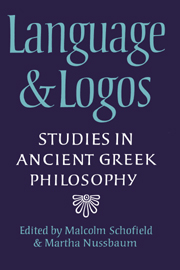Book contents
- Frontmatter
- Contents
- Preface
- Introduction
- 1 Heraclitus' conceptions of flux, fire and material persistence
- 2 Epistemology and meaning in Heraclitus
- 3 The dénouement of the Cratylus
- 4 Cratylus' theory of names and its refutation
- 5 Knowledge and language: the Theaetetus and the Cratylus
- 6 Falsehood and not-being in Plato's Sophist
- 7 Forms and dialectic in the second half of the Parmenides
- 8 Aristotle and the more accurate arguments
- 9 Aristotle on the principles of change in Physics I
- 10 Aristotle on natural teleology
- 11 Accidental unities
- 12 Aristotle's concept of signification
- 13 Saving Aristotle's appearances
- 14 Myths about non-propositional thought
- 15 Gods and heaps
- Bibliography of the publications of G. E. L. Owen
- Index locorum
- Index of names
8 - Aristotle and the more accurate arguments
Published online by Cambridge University Press: 09 October 2009
- Frontmatter
- Contents
- Preface
- Introduction
- 1 Heraclitus' conceptions of flux, fire and material persistence
- 2 Epistemology and meaning in Heraclitus
- 3 The dénouement of the Cratylus
- 4 Cratylus' theory of names and its refutation
- 5 Knowledge and language: the Theaetetus and the Cratylus
- 6 Falsehood and not-being in Plato's Sophist
- 7 Forms and dialectic in the second half of the Parmenides
- 8 Aristotle and the more accurate arguments
- 9 Aristotle on the principles of change in Physics I
- 10 Aristotle on natural teleology
- 11 Accidental unities
- 12 Aristotle's concept of signification
- 13 Saving Aristotle's appearances
- 14 Myths about non-propositional thought
- 15 Gods and heaps
- Bibliography of the publications of G. E. L. Owen
- Index locorum
- Index of names
Summary
In Metaphysics 19 Aristotle mentions several Platonic arguments for forms. These were set out in detail, along with Aristotle's criticisms, in his essay Peri Ideōn, portions of which are preserved in Alexander's commentary on 19. In this chapter I explore the logic of some of these arguments and the interconnections between them.
Aristotle divides the arguments he discusses into two classes, the less and the more accurate arguments; but he says very little about the basis of this division. I shall suggest that the more, but not the less, accurate arguments are valid arguments for Platonic forms; and I shall claim that although Aristotle is no friend of the forms, he concedes to the Platonists that they are valid arguments for forms. But the concession is coy. For, Aristotle argues, these arguments lead to intolerable results and so cannot be sound. One leads to a vicious infinite regress, the third man, and the other produces forms of relatives, ‘of which we say there is no independent class’ (Metaph. 990b16–17). From this point of view, the less accurate arguments are to be preferred. For although they are invalid arguments for forms, they are valid and, so Aristotle seems to believe, sound arguments for his own universals, the koina.
If this interpretation is correct, it suggests an interesting result: that the overall structure of the Peri Ideōn is neatly dilemmatic. The Platonists can rely on two sorts of arguments for forms, their more and their less accurate arguments.
- Type
- Chapter
- Information
- Language and LogosStudies in Ancient Greek Philosophy Presented to G. E. L. Owen, pp. 155 - 178Publisher: Cambridge University PressPrint publication year: 1982
- 2
- Cited by



